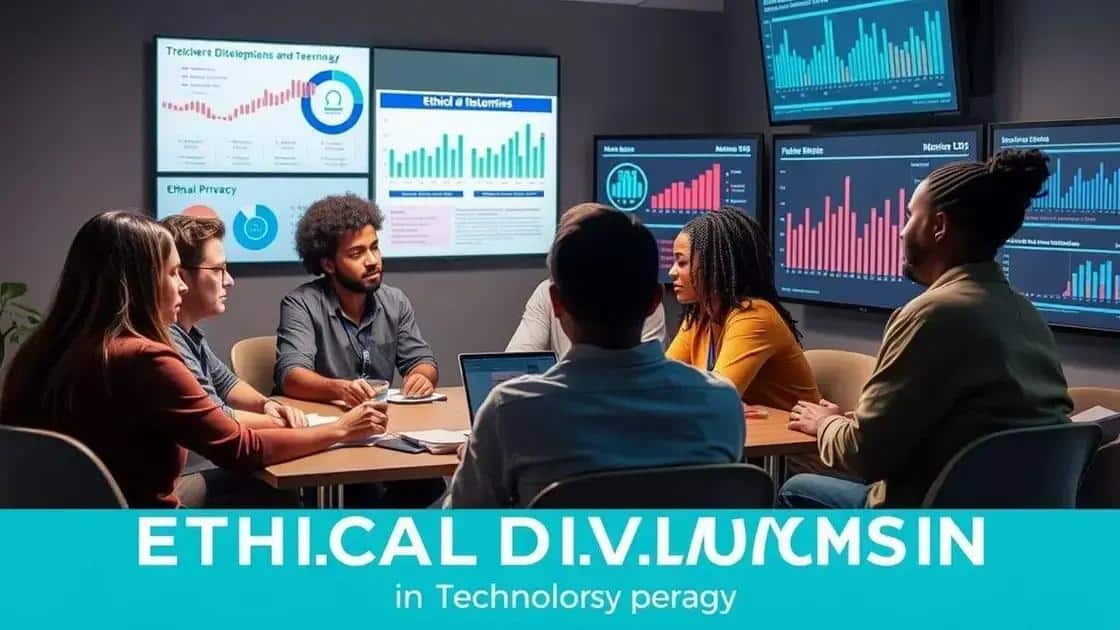Technological ethics debates: exploring dilemmas in tech

Anúncios
Technological ethics debates focus on the moral implications of technology, including issues like privacy, algorithmic bias, and the role of public opinion in shaping regulations and ethical guidelines.
Technological ethics debates are more relevant than ever as technology rapidly evolves. Have you ever wondered how these discussions impact our daily lives and future innovations? Let’s dive into this essential topic.
Anúncios
Understanding technological ethics
Understanding technological ethics is essential in our modern world. As technology continues to evolve, so do the ethical implications that come with it. These debates often center around how technology affects our lives, society, and the environment.
What is technological ethics?
Technological ethics explores the moral principles and issues arising from technological advancements. With the increase in digital technologies, we need to be aware of the ethical challenges that accompany them.
Anúncios
Key aspects of technological ethics
There are several critical factors to consider:
- Privacy concerns surrounding data collection.
- The impact of automation on employment.
- The potential for bias in artificial intelligence.
- Environmental sustainability in tech production.
Understanding these aspects will help individuals and organizations navigate ethical dilemmas. Moreover, public discussions are vital for shaping perceptions and policies regarding technology.
As society becomes more connected, the importance of ethical considerations grows. We are all affected by technology, thus all have a stake in these discussions. It’s crucial to strike a balance between innovation and ethical responsibility.
Through engagement in technological ethics, we foster a more responsible approach to tech development and implementation. By considering the ramifications of our technological actions, we can work together for a better future.
Key ethical dilemmas in today’s technology

Today, we face several ethical dilemmas as technology advances rapidly. With every new innovation, moral questions arise that affect society deeply. Understanding these challenges is essential for informed discussions.
Privacy Issues
One of the most pressing dilemmas is privacy. As companies collect vast amounts of personal data, individuals may feel their personal lives are invaded. Consumers are often unaware of how their information is stored and used.
Algorithmic Bias
Algorithmic bias is another concern. Technology is meant to be impartial, yet biases can emerge from the data used to train algorithms. This can lead to unfair outcomes in areas such as hiring, lending, and law enforcement.
- Algorithms may favor specific demographics.
- Minorities could be unfairly treated.
- Transparency in AI is crucial.
Moreover, automation continues to disrupt the job market. With robots and artificial intelligence taking over tasks once done by humans, workers face uncertainty. While automation can increase efficiency, it can also lead to job displacement.
Additionally, the environmental impact of technology manufacturing is profound. From e-waste to energy consumption, the industry needs to consider sustainable practices. As consumers become more eco-conscious, companies must adapt to meet these demands.
Addressing these dilemmas requires collaboration among policymakers, technologists, and the public. Raising awareness is essential. Engaging in discussions on ethical dilemmas will help shape a better future in technology.
The role of public opinion in ethical debates
The role of public opinion in ethical debates is crucial. As technology evolves, people’s views help shape the direction of these discussions. When people express their concerns or support, they influence how companies and governments address ethical issues.
Public Awareness and Engagement
Awareness plays a key part in public opinion. As more individuals become informed about ethical dilemmas, their engagement increases. This leads to more informed debates about data privacy, AI ethics, and more.
Media Influence
The media also shapes public perceptions. News coverage can highlight ethical issues, which may prompt discussions among communities. Social media platforms have given people a voice, allowing them to share opinions quickly.
- Social media campaigns raise awareness.
- Public protests solicit change in policies.
- Online petitions mobilize support for ethical causes.
Companies are starting to recognize the importance of public sentiment. They often adjust their practices based on customer feedback. When enough people voice their concerns, companies can feel pressured to align with ethical standards.
Moreover, policymakers must listen to the public. Laws and regulations are more likely to reflect the values and concerns of citizens when there is a strong public discourse. For ethical debates to thrive, open channels of communication are essential.
Balancing corporate interests and public opinions is not easy. However, facilitating discussions and engaging diverse voices can lead to better outcomes. Encouraging dialogue fosters a society that values ethics and accountability.
Navigating regulations and ethical guidelines

Navigating regulations and ethical guidelines is essential in our tech-driven world. As technology progresses, so do the laws that govern it. Understanding these regulations helps companies maintain compliance and foster public trust.
Importance of Compliance
Compliance with laws and regulations protects not only businesses but also consumers. When companies follow the rules, they ensure that customer data remains safe and that their practices are ethical. This can prevent damaging scandals and build a positive reputation.
Types of Regulations
Many regulations affect technology companies:
- Data protection laws, like GDPR, set standards for handling personal information.
- Intellectual property laws protect original content from unauthorized use.
- Consumer protection laws ensure fair treatment of customers.
Staying informed about these regulations is crucial. Changes can occur rapidly, and companies must adapt to avoid legal issues.
Moreover, ethical guidelines often go beyond legal requirements. Companies may choose to implement internal policies that support responsible technology use. These guidelines can cover areas like transparency, fairness, and accountability.
Engaging with stakeholders, including employees and customers, can help shape these policies. Open dialogues about ethical practices not only enhance company culture but also reflect public concerns. Balancing innovation with ethical considerations fosters trust among consumers, leading to better long-term outcomes.
As technology continues to evolve, the relationship between regulations, ethical guidelines, and public opinion is crucial. Companies that prioritize ethics and compliance will likely succeed in the long run.
FAQ – Frequently Asked Questions about Technological Ethics
What are technological ethics?
Technological ethics explores the moral implications of technology usage, focusing on issues like privacy and fairness.
Why is public opinion important in tech ethics?
Public opinion shapes ethical discussions and influences how companies and governments respond to technological challenges.
What are some key ethical guidelines for technology?
Key ethical guidelines include data protection, transparency in AI, and fair treatment of users.
How can companies ensure compliance with regulations?
Companies can keep track of changes in laws, conduct regular audits, and foster a culture of ethical responsibility.






